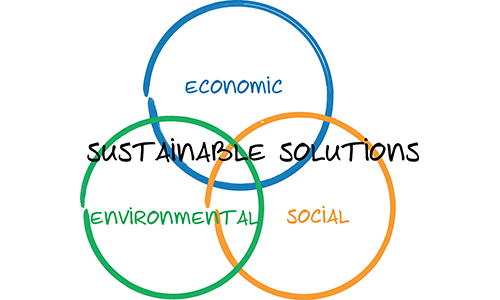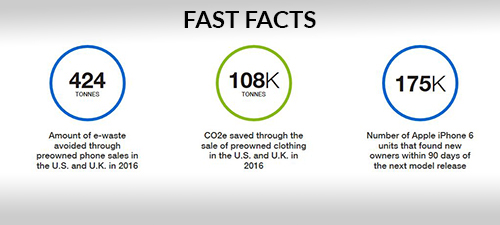

In every era, certain organizations are considered industry leaders. However, the set of criteria that earns that distinction and defines leadership evolves over time, ranging from operational and R&D excellence, to new product development, or a focus on core competencies. Then the focus shifted around the ability to innovate. The bar has again been raised and most recently the foundation of business leadership has focused to encompasses corporate sustainability.
Critics often say that there is not a single major corporation that is doing enough to adequately confront issues such as climate change and resource scarcity. However, there is a growing number of companies that are deeply committed to environmental sustainability and preservation. Some examples include Nestlé, IBM, Cisco, Target, eBay, and many others. These companies are actively contributing to the protection of the environment.

Companies that can make efficient and responsible use of natural resources and human capital are more likely to be the destination of choice for talent and investment. More CEOs are grasping the fact that the world has already entered an era in which a business’s reputation has become an important measure of competitiveness. Sustainability has emerged as one of several key criteria for judging the quality of companies. The concept of sustainability extends beyond environmental impact, although this is naturally a key consideration for manufacturing businesses. Sustainability should be an integral part of a business strategy. Take note of how integration of sustainability is occurring the core business models of industry giants that distinguishes them as leaders.
Below are a few examples of sustainability practices shared by industry leaders that have proven to be successful and can be applied to virtually any business, large and small.
1. Advertise & Promote Sustainability Practices: Focus operational initiatives, communications, and advertising on strategically selected themes tied to sustainability. IBM's advertising has been focused almost exclusively on environmental program outcomes and social benefit versus products and services. Communications are focused on selected themes tied to the core of the business: sustainability. Varied and complementary communications to key stakeholder groups are used to spread the word, and others are following suit.
eBay is considered a Green Giant where core business activity is based on the key principle of reusing (reselling) products. Actively promoting the idea of consuming used stuff, which conserves resources and protects the environment is a prime example of introducing green practices throughout the company. eBay was driving a circular economy long before most people even knew what it meant, which is portrayed in this video.

Cisco provides a range of communications geared toward the socially responsible investment community, the market for talent, and those focused on social responsibility and/or environmental issues.
2. Integrate Sustainability Into Your Brand & Reputation: Leading the way thematically and operationally, Cisco concentrates on demonstrating leadership on two issues, closely linked to its business and brand. Socially, Cisco is focused on education and helping people around the world develop and use IT skills. The environmental theme is to be “Energy-wise”– helping customers reduce greenhouse emissions and create smart buildings.
IBM, a first mover in integrating sustainability into its brand, has effectively used its Smarter Planet theme to communicate how the company helps its clients enhance their performance in ways that foster sustainability. Likewise, at Nestlé, sustainability has been integrated into the brand, and success in these efforts is considered crucial to Nestlé’s future success and integral to business strategy and reputation.
3. Maximize Your Value Proposition: Commit to sustainability to enhance the overall value proposition of your business to investors, stakeholders and consumers. Identify synergies and form environmental protection alliances with business partners. Closely examine your value chain. Seek areas to collaborate with local leaders to improve nutrition, water quality and rural development. Nestlé is a company that accomplishes this with a commitment to sustainable practices that improve communities where their products are sourced worldwide. This industry giant has focused its corporate strategy around creating shared value by combining adherence to key operating principles and achievement of improvement in the communities where products are sourced worldwide.
4. Show Accountability for Your Environmental Impact: Responsibility can be demonstrated through alliances formed to foster progress on targeted sustainability issues. Leading companies take responsibility for their environmental impact as well as considering business partners and actively communicate their internal polices and expectations. Target has been integrating sustainable practices across all aspects of business operations and is known for its active position in building healthy communities. Offering reusable shopping bags and recycling kiosks in its stores makes Target a leader in promoting healthy living. eBay took their efforts a step further by installing solar roof panels in its headquarters and decreasing greenhouse gas emissions.

Furthermore, it’s critical to maintain measurable standards and report on progress. Frequent transparent reporting is standard and has become expected. Report on measures implemented, outcomes and the environmental benefits.
Small businesses can and should consider sustainability for two very simple reasons:
The major part of running a sustainable business doesn’t necessarily have to include giving up established practices. It is about making smart choices that will improve efficiency, which is the part that most stakeholders should find interesting because of one simple reason — higher efficiency means less waste, which means fewer costs, which means higher profits. Improving efficiency and performance is also an important part of keeping a business competitive, so going down the sustainable road can help small businesses in many ways.
If you would like to review Ascentium Capital's sustainability policy, click here to request a copy.
---
If you're looking to distinguish yourself along with the leading environmentally friendly companies and invest in a more sustainable future for your business, Ascentium Capital can help. We specialize in helping SMBs with all major business initiatives – from conversion to energy efficient LED lighting to environmentally friendly technology solutions – let us help you take your business a more sustainable place.
Ascentium Capital offers affordable LED lighting finance programs to help light the way to a more profitable business. Contact us today to learn more about these and many other fast, flexible finance programs that can be tailored to suit the unique needs of your business.

Leave a Reply
Leave a ReplyYour email address will not be published. Required fields are marked*